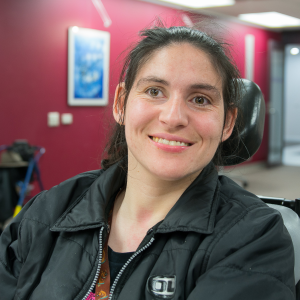What the DEAA Peer Group means to me
My name is Jane Quirk. I’m a member of Disability Elders of All Ages (DEAA). The peer group means so much to me, and turns out it’s been very important to my fellow member, Tiffany Littler. I asked her a few questions about what the peer group has brought to her life. Here is what she had to say.

Tiffany Littler
What has the peer group brought to your life?
It has brought so many great things into my life. It’s given me confidence and passion to contribute to the disability sector. It’s provided me opportunities to speak up and get my voice out there. It’s allowed me to grow new skills and also practice the skills I already had, with my counselling and advocacy background. It’s helped me find better ways with the NDIS. It has opened so many doors, as in activities, online resources and so much more. It has really enriched my life.
How do you think a peer group could help others?
It could help others by providing more connection in their lives. Some people with disability don’t have a lot of connection. Some only have support workers and their family, and they don’t really see what the disability community is doing. It also provides a wealth of information and resources. It is a great network to have.
Is there anything you do differently today because of your involvement in the peer network?
Yes. It has helped me know what my rights are, and not be scared to speak up. Now I am always pointing out what services are important to me. I’ve been able to access help and resources that I wouldn’t have even known about before. I’ve also participated in speaking and facilitating opportunities that I wouldn’t have done otherwise.
Another thing it has done is given me ideas for how I can use technology to assist me.
Has the group helped you throughout the COVID pandemic?
Yes. I get emotional talking about this because it has helped me, with everyone checking in on each other and knowing we aren’t alone. It has given me hope and the support of friends going through the same thing.
Our ultimate goal is to create a truly inclusive world where disabled and abled-bodied people mix together as equals. So why is it still important to have a peer group only for disabled people?
I’ve noticed that people feel more confident to speak up, because we all can relate to each other through the disability experience. The group is made up of people with all different types of disability, so we don’t all have the same opinions, experiences or outlooks, but we all share disability.
What would you say to people living with disability to convince them to join a peer group?
The peer group means a lot to me. They are like my family. It’s such a good resource for people with disability, especially for those of us that suffer with depression. I look forward to going to the peer network because I know I am going to spend time with my friends and forget about my problems. After I go to a peer network group, I feel the strength to keep going and being me, and not hide myself. It just gives you a positive outlook on life.
It means so much to me. I don’t know where I would be without it.
It was great to speak with Tiffany about this, and so much of what she said resonates with me. I think the peer group is an amazing resource and I encourage you to get involved.